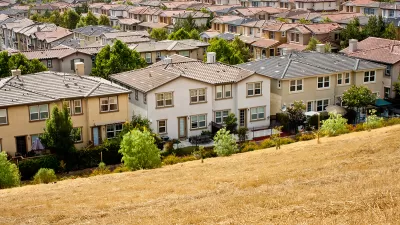Research from the Urban Institute finds that economic hurdles, not just lifestyle preferences, are stopping millennials from buying homes.

Across the U.S., the decline in homeownership among millennials compared to generations past is marked: "For millennials, ages 25 to 34, homeownership is 8 percentage points lower than [it was for] baby boomers at that age and 8.4 points lower than Generation X," Jeff Anderson reports for Curbed. A new report from the Urban Institute asks why this crucial American wealthbuilding strategy appears increasingly unavailable to a generation of young adults, and found that a confluence of debt burden and high housing costs are keeping it out of reach.
In many cases, moving to urban centers for access to good jobs turns out to be a trade-off in terms of a cost of living. In many major cities, rents far outpace incomes and the supply of affordable housing is constrained, making it difficult to save enough to buy a home.
The report also finds that the burden of student debt—which today comes to nearly $1.5 trillion—could account for up to a third of the decline in millennial homeownership. "Buying a home used to be the largest expense a household would make in their lifetime, but over the last 20 years student loan debt has ballooned, loading millennials up with debt before they reach prime home-buying age," Anderson explains.
FULL STORY: Why aren’t millennials buying houses?

Planetizen Federal Action Tracker
A weekly monitor of how Trump’s orders and actions are impacting planners and planning in America.

Congressman Proposes Bill to Rename DC Metro “Trump Train”
The Make Autorail Great Again Act would withhold federal funding to the system until the Washington Metropolitan Area Transit Authority (WMATA), rebrands as the Washington Metropolitan Authority for Greater Access (WMAGA).

The Simple Legislative Tool Transforming Vacant Downtowns
In California, Michigan and Georgia, an easy win is bringing dollars — and delight — back to city centers.

The States Losing Rural Delivery Rooms at an Alarming Pace
In some states, as few as 9% of rural hospitals still deliver babies. As a result, rising pre-term births, no adequate pre-term care and "harrowing" close calls are a growing reality.

The Small South Asian Republic Going all in on EVs
Thanks to one simple policy change less than five years ago, 65% of new cars in this Himalayan country are now electric.

DC Backpedals on Bike Lane Protection, Swaps Barriers for Paint
Citing aesthetic concerns, the city is removing the concrete barriers and flexposts that once separated Arizona Avenue cyclists from motor vehicles.
Urban Design for Planners 1: Software Tools
This six-course series explores essential urban design concepts using open source software and equips planners with the tools they need to participate fully in the urban design process.
Planning for Universal Design
Learn the tools for implementing Universal Design in planning regulations.
Smith Gee Studio
City of Charlotte
City of Camden Redevelopment Agency
City of Astoria
Transportation Research & Education Center (TREC) at Portland State University
US High Speed Rail Association
City of Camden Redevelopment Agency
Municipality of Princeton (NJ)





























